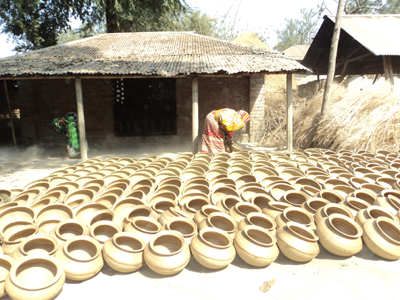
The materials made of plastic, melamine and aluminum for the purpose of being more durable, traditional pottery industry is in the verse of extinction from Bogura district.
The people involve with the profession are passing hard time to manage the family expenditure from last few years. They have begun to switch another profession leaving their ancestral job.
Without formal training, women and male artists make all kinds of pottery with the help of hand-carved soil. It is then dried in the sun and burned with a burning furnace.
Besides, the flocks used to make all kinds of things like open, bone, slender, colossal, bank, and various batches of batches, puppets and small toys.
The pottery had made here many reputations and fame producing different sort of clay pots; it is now making some kind of livelihood by making only pottery and openings.
“Due to use of plastic and iron home based commodities, good number families have kept up with their ancestors’ profession in many hardships,” Said Nitta Gopal Paul at Paiul para area under Dupchanchia upazila.
“As a result, the skilled artisans of the clay industry are now living a very poor and inhumane life with their family members for poor demand of the tools.” Paul added.
To make money to feed children and fable parents in all twelve upazilas of the district, many men have left their ancestral profession and moved to a different profession according the demand of the family members.
Some clay artisan claims that the main cause of this industry is scarcity of adequate soil. Once clay was available for free, but now clay is bought with paying money but they are not getting well price.
Artisan Arun Kumar Paul said in order to preserve this profession from the way of extinction they have taken measure but all are being failed.
President of Chamber of Commerce Md Masudur Rahman Milon said now many modern machinery of the clay industry has come out and the potters cannot buy it due to financial problems. The extinct heritage of the lost clay industry will come again with the government patronage and private co-operation, he added.